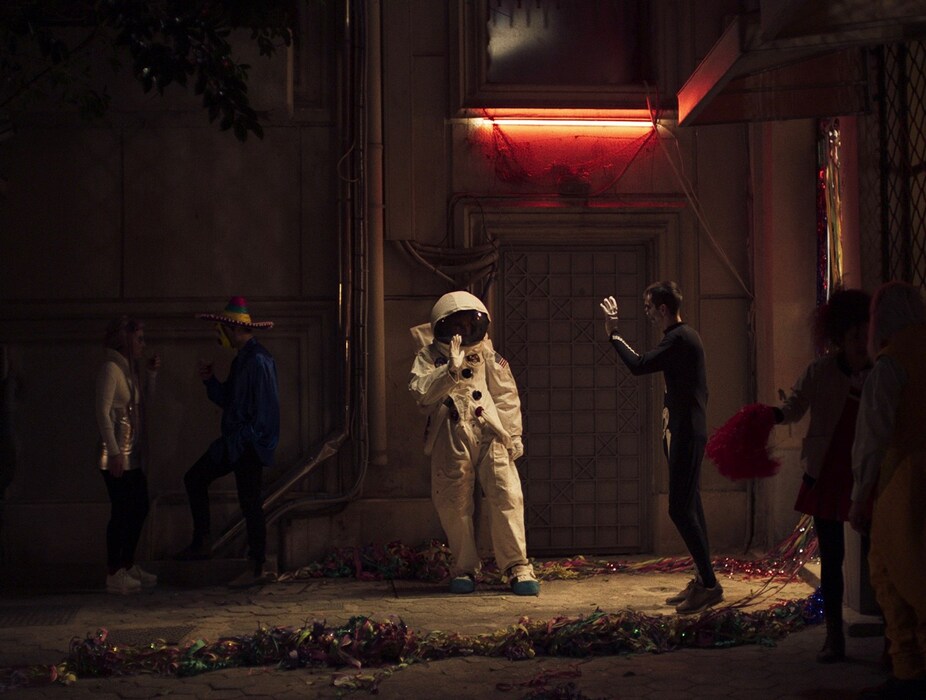Director Christos Nikou shares the story behind his feature debut, which explores our relationship with memory
From Strictly Ballroom’s triumphant finale to Mads Mikkelsen’s glorious turn in Another Round, dance has long been utilised by directors to execute their more cathartic scenes. In Christos Nikou’s Apples, the moment arrives one hour in. As Let’s Twist Again starts playing in an Athens bar, Aris (Aris Servetalis) slinks onto the dancefloor, his body moving in time to the music as one hand remains clasped around his drink. The scene, which was shot in a single take, provides Aris temporary respite from the film’s curious condition, while the track speaks to the feature’s ambiguous age. “In the script it was Billie Jean and the character had to moonwalk, but the song cost more than the budget of the film,” Nikou tells AnOther. “So we looked for a song that had a recognisable routine, like the Macarena, but something a bit nostalgic. I love the song and the dance to it – and it has the word twist. I love the word twist in general, and it’s something that plays a role in the movie.”
Apples, which marks the Greek director’s feature debut following stints assisting Yorgos Lanthimos (The Favourite) and Richard Linklater (Boyhood), premiered at the Venice Film Festival last September and was immediately championed by jury president, Cate Blanchett. “Totally unexpected,” Nikou recalls of the actor subsequently joining the project as executive producer. “We had a meeting in her hotel and talked about movies, and life in general, for almost two hours. We were still sending messages two months later, then she asked if she could help with Apples.” Set in a contemporary but indistinct period, the film finds Greece in the midst of an epidemic: sudden cases of amnesia are overwhelming its citizens, with a special ‘Disturbed Memory Department’ set up specifically to help those affected. With a high number of people brought in without ID and many left ‘unclaimed’, amnesiacs are encouraged to join a programme that helps them rebuild their lives, with new homes and identities. Each instruction on the path to independence is narrated via cassette tape and recorded with a Polaroid camera, from riding a bike to venturing into strip clubs.

“I was trying to deal with the loss of my father. I was trying to understand how selective our memory is, and why people forget so easily – how we can erase something that affected us, and if we erase it are we going to lose our existence? And could it be that we are the things we don’t forget,” asserts the director. “So, with these questions in my mind, we created this world that is close to the worlds I love to watch in movies – The Truman Show or movies by Charlie Kaufman – directors creating their own worlds in their movies that play in a more allegorical way.” The surreal disposition of Nikou’s world here is underscored by the limited research he conducted ahead of production, rejecting any medical advice in favour of warped realism. “We tried to make something that is a bit realistic but how we see the realism, and not how the doctors would see it.”
In a similar vein, the film’s title was determined by multiple components. In part a tribute to Nikou’s late father – a man capable of consuming eight apples a day and who had fantastic memory – elsewhere it references our collective reliance on electronic hardware. “I feel like right now, we store our data mostly in devices,” says Nikou. “Technology has affected our memory and we store our data mostly in devices not in our minds, and most of the time these devices are from the company Apple. So, we store our data in our phone, in our MacBook ... Our memories are there right now, our memories are in apples. It’s ironic.” The use of cassette tapes and Polaroid cameras – technology from another time – is a further nod to the nostalgic sentiment that runs through the film. “I believe that it’s very easy to make a movie where you want to make a comment on technology by using technology, with cellphones in hands all the time, but I feel it’s much stronger when you imply these things,” he tells AnOther.
Still, despite the director’s reluctance to indulge in modern gadgets, he inserts valuable cultural references into the film, setting up scenarios that rely on a relative understanding of prominent moments in recent entertainment history. In the case of a paramedic who asks a group of partygoers, sincerely, if “anyone knows Batman” (they’re in costumes), the context is comedic. Later, Aris befriends another amnesiac called Anna (Sofia Georgovassili) outside a cinema, who advises him on taking better pictures for his development album. As the pair head out for a drive (Anna is further ahead in the program), she recounts the plot to a film she watched about a rich redhead who meets a man on a boat that later crashes into an iceberg. “We tried to find songs and movies that even an amnesiac could remember, because it’s something so deep in the memory of people in this world,” says Nikou, “The most popular movie maybe ever, that everybody recognises.” A keen cinephile since his teens, at one time averaging three films a day, he admits to crying at James Cameron’s Oscar-winning picture on his first watch many years ago, an emotional reaction that feeds Anna’s on-screen retelling.
While the writing process behind Apples was shaped by an intimate grief, the film’s perspective – and particularly the pandemic narrative – today feels wholly universal. “For sure,” acknowledges Nikou, “the audience will resonate a little easier right now, understanding the uncertainty about the future of a pandemic. But we also describe all the loneliness, the desolation. On the other hand, we tried to give an optimistic approach to a pandemic with the ending.” More so however, he sees the film’s principle subject – memory – as completely timeless and ultimately familiar. “So I hope the audience will keep the movie, or some moments of the movie, in their memory much longer after the end credits roll and they will enjoy it, that’s the most important.”
Apples is released on Curzon Home Cinema on May 7.





